LisbonLisboaPortugal.com
The best independent guide to Lisbon
LisbonLisboaPortugal.com
The best independent guide to Lisbon
Lisbon metro; an independent tourist guide for 2026
Lisbon metro is safe, inexpensive, and often the quickest mode of transportation around the city. It consists of four metro lines, covering a total of 46km of track, which are served by 55 stations.
The first service of the day is at 6.30am, with the last service being at 1am (some minor stations close at 9.30pm). The frequency of services depends on the time of day and day of the week, but typically there is a departure every 6 to 12 minutes.
The metro is the recommended means of travel from Lisbon Airport to the city centre, and it should be the preferred means of travel when exploring the city. This guide will provide an overview of the metro network, including 2026 fares and a map of the metro.
Information: The metro covers the eastern, northern and southern areas of Lisbon, but there are no services to the west. If you want to visit the Belem district, then the E15 tram is the best option.
Related articles: Lisbon airport to city centre
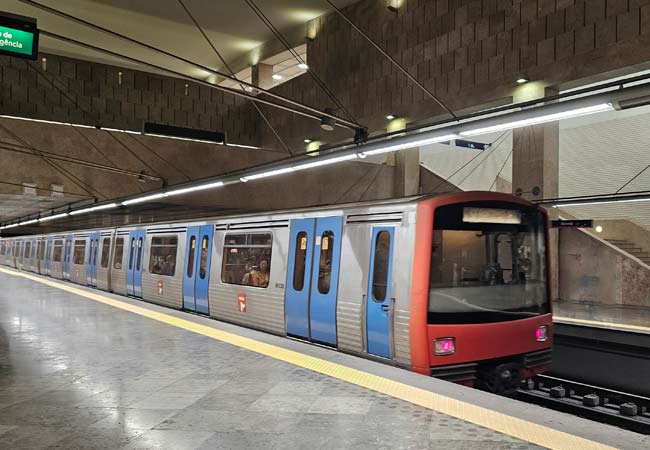
Lisbon metro is the fastest way to travel around the city.
Lisbon metro fares in 2026
Lisbon metro operates within two fare zones, but all the main tourist areas, including the airport, fall within Zone 1. The 2026 Lisbon metro fare prices are:
• €1.90 – Single Fare
• €7.25 – 24-hour unlimited travel, which includes all Lisbon buses and trams.
• €1.72 – Fare when using the pre-loaded 'Zapping' ticket (see zapping section later in this article)
There are no return tickets, but multiple single tickets can be purchased for return journeys. The fare is charged to the reusable 'Navegante' card, which costs €0.50 for the initial purchase. This card can store a range of metro tickets, including multiple single fares, a 24-hour pass, or the 'zapping' credit. Please note that each passenger requires their own Navegante ticket.
As of 2026, metro fares can be paid directly at the barriers using a contactless bank card, eliminating the need to purchase a separate ticket. The contactless fare is alomst the same as a single ticket, €1.92, though it's more expensive than the zapping fare. To use the contactless payment method, approach any metro gate, hold your contactless bank card over the payment panel on the gate, and the gate will open once the payment has been processed.
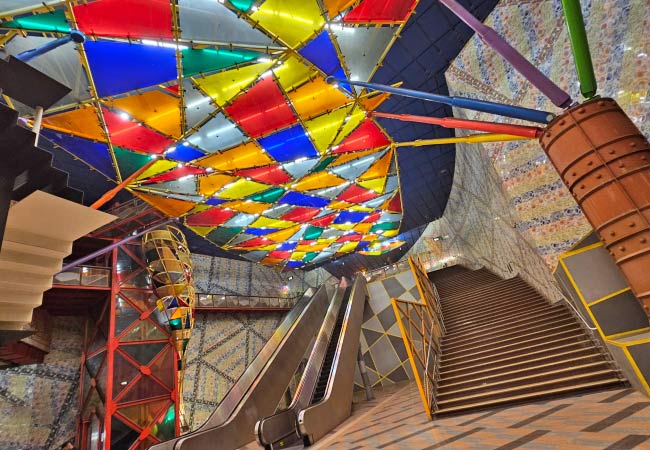
The colourful Olaias metro station
The 2026 Map of Lisbon Metro
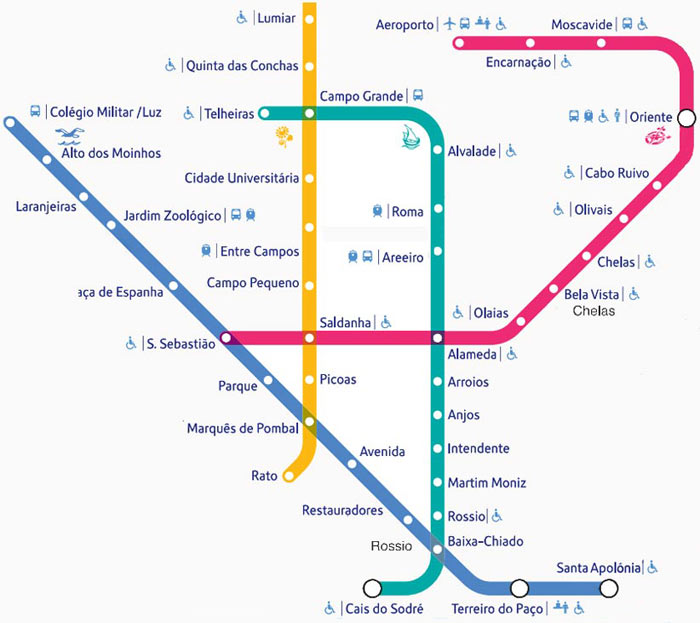
The map above is a stylised representation and does not accurately depict the distances between stations. For a more realistic view, refer to the interactive map below, which shows the actual locations of the metro stations in relation to the city (Note: you may need to zoom in to view all points):
In the historic areas of Lisbon, such as the Alfama, Baixa and Chiado districts, it is quicker to walk than to catch the metro.
The 'zapping' metro ticket
The zapping ticket is the most useful public transport ticket for tourists, and it is highly recommended to purchase one during your stay in Lisbon.
This ticket allows you to charge the Navegante card with credit, which can be used on any public transport in the greater Lisbon region. This includes the metro, trams, buses and ferries, along with the railways to Cascais and Sintra.
The zapping ticket is beneficial for two reasons: Firstly, it provides slightly cheaper fares than a single ticket, such as €1.72 instead of €1.90 for the metro, and €1.35 instead of €3 for a tram or bus. Secondly, it removes the hassle of paying for bus and tram tickets with cash from the driver, as most buses and trams do not accept bank card payments.
The zapping ticket can be loaded with between €3 and €40, and the credit remains valid for a year. Please note that the zapping ticket can only be purchased and recharged at a metro station ticket machine. To check the remaining balance on your card, simply insert it into any ticket machine.
Advice: We recommend buying a Navegante card with €15 of zapping credit at the start of your trip to Lisbon. This will allow you to conveniently hop onto any bus or tram while sightseeing. The zapping ticket can also be used to pay for the train to Sintra or Cascais, helping you avoid long queues at the train stations.
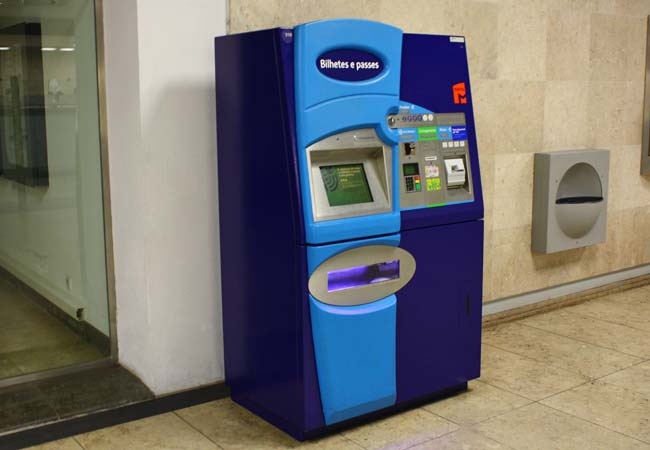
The metro ticket machines accept coins, notes and cards
The 24-hour ticket
Another option for tickets, which is useful if you are planning a lot of travelling in a single day, is the 24-hour public transport ticket. This costs €7.25 and covers all public transport in Lisbon, but does not include the trains to Sintra or Cascais. This ticket can provide exceptional value if you're visiting Belem, planning to sightsee along the number 28 tram route, or wish to ride the funiculars.
This 24-hour ticket can be only purchased from a ticket machine in a metro station and is charged onto the 'Navegante' card.
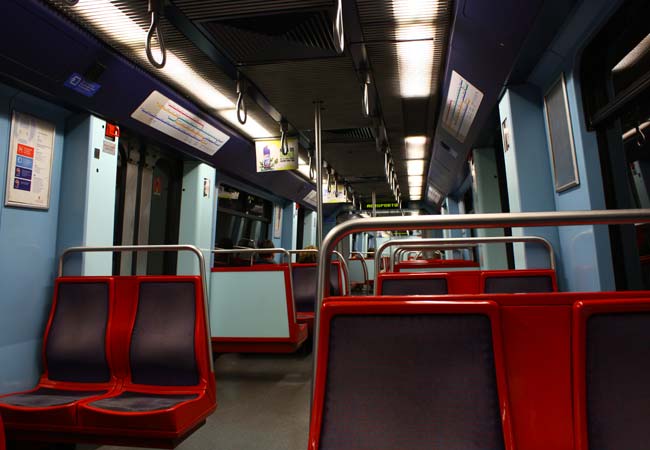
Lisbon metro is clean, safe and relatively modern
Lisbon metro at the airport
One of the first journeys most visitors take using the metro is the onward journey from Lisbon Airport. The airport is only 7km north of the city centre, and the metro is the best means of onward travel within Lisbon for most people.
The airport is connected to the red metro line, and the station is just outside of the arrivals building. Most visitors stay within the Alfama or Baixa neighbouhoods, and to travel to these areas you need to change to the blue or green metro line.
Related articles: Onward travel from Lisbon airport
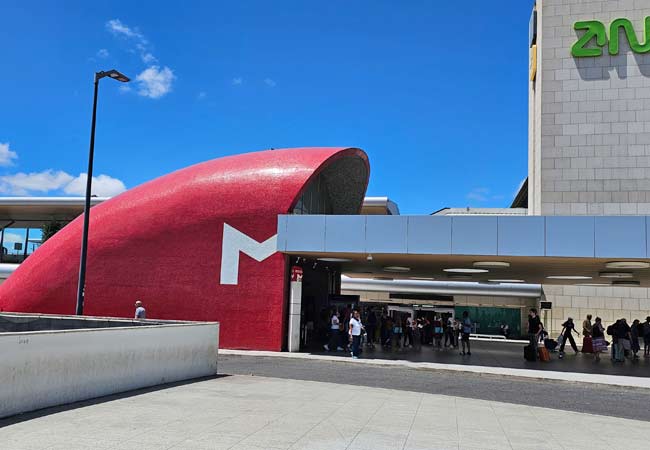
The distinctive entrance to the metro at Lisbon Airport
Tips for Lisbon metro
When a ticket is purchased from a ticket machine, a receipt is printed. It is advisable to take this receipt in case there is an issue with your Navegante card.
For each journey, the Navegante card is used twice, once to swipe into the metro station and for a second time on exiting the destination metro station. At the barrier, place the Navegante card on the sensor on the right-hand side, and the barrier will open.
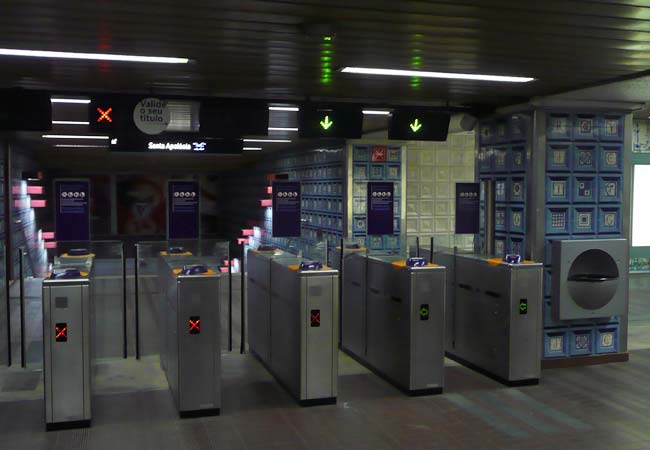
As with all public transport in busy cities, be aware of your surroundings and do not offer thieves the opportunity to steal items. The incidences of theft on the Lisbon metro system are no worse than in any other big city, but always remain vigilant. If travelling late at night, sit in busy carriages and away from dodgy-looking people.
Lisbon metro routes overview
There are four metro lines, and they are conveniently coloured; blue, yellow, green and red.
The two oldest lines (green and blue) follow the two main avenues out from the city centre, while the yellow line serves the northern areas of Lisbon. The red metro line connects the airport and the Parque das Nações district to the other three lines. This layout does mean there are significant areas of the city not covered by the metro, including the hill section of Alfama, the Graça district and most of western Lisbon (Belem, Estrela and Alcântara).
As a visitor, you are most likely to use the metro when travelling to or from the airport or visiting the Parque das Nações area.
History of Lisbon Metro
Construction of the Lisbon metro was started in August 1955 and the first service was on 29 December 1959. The initial metro was just 6.5km long and connected Baixa to Jardim Zoológico. During the 1980s a loop of central Lisbon was constructed and in 1995 the network was split into two lines, the Blue Line and the Yellow Line.
In May 1998 a third line, the Red Line, was constructed to connect Alameda station to the exhibition grounds of Expo 98. In 2004 the Blue, Yellow and Green lines were further extended. An extension to Portela Airport was opened in September 2013 and connects the red line to the airport, which connects to all other lines. The Lisbon metro network is now served by 55 stations and covers 46 kilometres (25 miles).
Discover more of Lisbon with our most popular guides
If you've found our content valuable, we'd welcome your support.
The digital publishing landscape has evolved significantly. As a small independent publisher, we face growing challenges. Search engines increasingly favour paid content over organic results, while AI-generated content often reproduces original work without attribution.
To support our work, please consider bookmarking this page (press Ctrl + D) for quick access. If you find an article helpful, we'd be grateful if you'd share it with friends on social media.
For specific questions, please see our Reddit community at r/LisbonPortugalTravel.
Should you notice any outdated or incorrect information, please contact us at [email protected]
Thank you for helping us continue to provide valuable content in an increasingly challenging digital environment.
A complete list of all of our Lisbon articles
If you've found our content valuable, we'd welcome your support.
The digital publishing landscape has evolved significantly. As a small independent publisher, we face growing challenges. Search engines increasingly favour paid content over organic results, while AI-generated content often reproduces original work without attribution.
To support our work, please consider bookmarking this page (press Ctrl + D) for quick access. If you find an article helpful, we'd be grateful if you'd share it with friends on social media.
For specific questions, please see our Reddit community at r/LisbonPortugalTravel.
Should you notice any outdated or incorrect information, please contact us at [email protected]
Thank you for helping us continue to provide valuable content in an increasingly challenging digital environment.



































